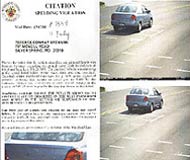Article from: www.thenewspaper.com/news/44/4485.asp
8/12/2014
Maryland: Group Accuses Speed Camera Operators Of Lying About The Law
Courts and municipalities in Maryland mislead the public into snitching on family and friends over speed camera tickets.
 The Maryland Drivers Alliance says local governments have been lying about the law to boost speed camera cash through snitching. The advocacy group filed formal complaints last week against cities and counties that have been telling innocent motorists who receive a photo ticket that they must turn informant against wives, husbands, children or friends when a speed camera ticket arrives in the mail, even though the law says that is not the case.
The Maryland Drivers Alliance says local governments have been lying about the law to boost speed camera cash through snitching. The advocacy group filed formal complaints last week against cities and counties that have been telling innocent motorists who receive a photo ticket that they must turn informant against wives, husbands, children or friends when a speed camera ticket arrives in the mail, even though the law says that is not the case.
The group filed a complaint with the newly created speed camera "ombudsman" for the city of Gaithersburg pointing out that the city's website told motorists who were not driving at the time of the alleged violation that there is only one way to get out of the ticket.
"The law provides that the registered owner must provide a signed affidavit that states they were not operating the vehicle at the time of the violation and provide the name, address and, if possible, the driver's license identification number of the person who was driving at the time of the violation," the city website claimed. "The police have the discretion to then forward the citation notice to the person identified by the registered owner."
Identical language, provided by the for-profit camera vendor, is found on the Montgomery County website and similar wording is used on the Maryland state speed camera page. While the language may have been accurate when it was first drafted, state law changed five years ago when the General Assembly deleted the requirement for an innocent ticket recipient to identify the driver. The Maryland Drivers Alliance is demanding that Gaithersburg and the other jurisdictions remove the obsolete and incorrect language from their websites.
"The city of Gaithersburg is making an objectively false statement on their website regarding the requirements of the law, in a way that has the practical effect of biasing the system in favor of the collection of fines rather than the protection of the rights of the innocent," the group's complaint states. "The language on the city of Gaithersburg website attempts to nullify the 2009 change to the statute which removes the requirement that a person identify the driver."
The state court similarly developed a uniform citation that does not inform drivers that, under the law, they have no obligation to identify the driver of the photographed vehicle. Instead, the wording implies that an innocence defense requires snitching on someone else.
"If you, as the registered owner, were not operating the vehicle at the time of this infraction and you choose to identify the person who was, you shall provide to the district court a sworn to and affirmed statement and mail by certified mail, return receipt requested," the Maryland uniform citation states. "Your statement must indicate you swear or affirm that the person named in the citation was not operating the vehicle and include any corroborating evidence."
John Morrissey, the chief judge of the Maryland district court, refuses to entertain any modification to the way Maryland citations are worded.
"The statute does not require that the citation suggest possible defenses to the defendant, which could be considered providing legal advice,'" Angelita Plemmer Williams, a spokesman for the Maryland Judiciary, said in a written statement.
The Maryland Drivers Alliance considers the uniform citation language giving the ticket recipient instructions on how to snitch on someone else to be "providing legal advice."
 The Maryland Drivers Alliance says local governments have been lying about the law to boost speed camera cash through snitching. The advocacy group filed formal complaints last week against cities and counties that have been telling innocent motorists who receive a photo ticket that they must turn informant against wives, husbands, children or friends when a speed camera ticket arrives in the mail, even though the law says that is not the case.
The Maryland Drivers Alliance says local governments have been lying about the law to boost speed camera cash through snitching. The advocacy group filed formal complaints last week against cities and counties that have been telling innocent motorists who receive a photo ticket that they must turn informant against wives, husbands, children or friends when a speed camera ticket arrives in the mail, even though the law says that is not the case.